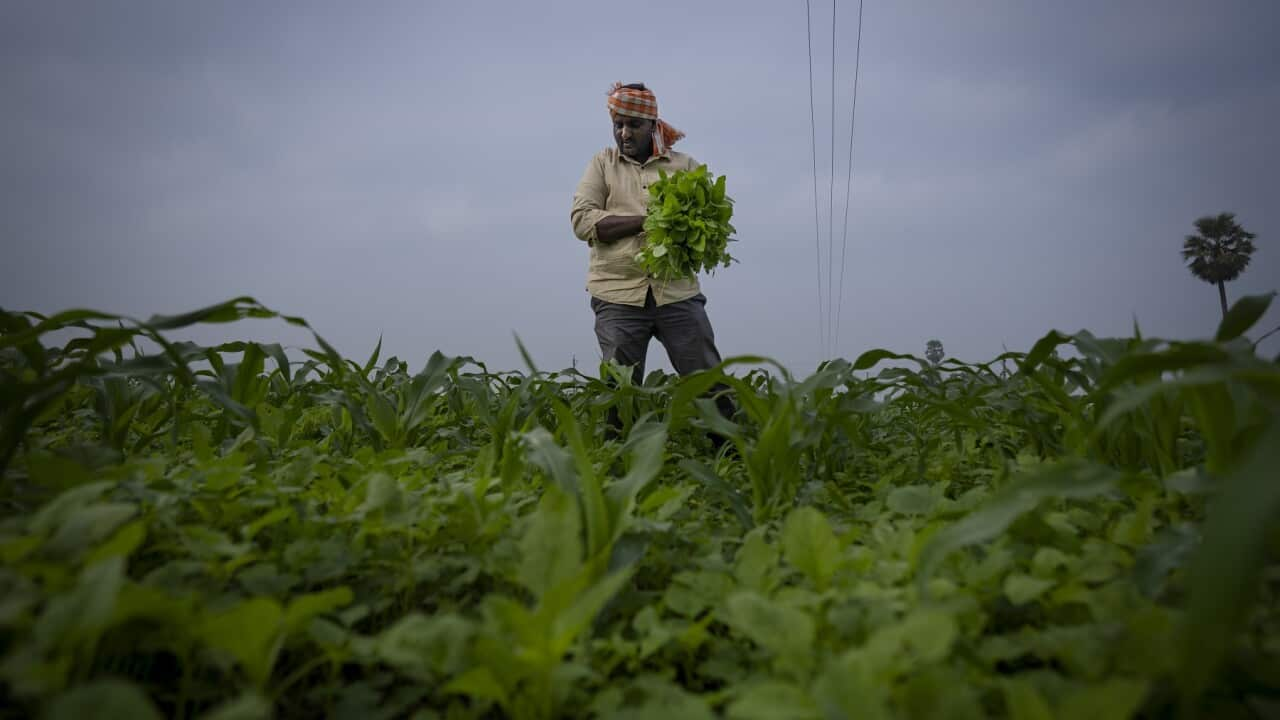TRANSCRIPT
When Cyclone Michaung struck India last year, it brought wind speeds of up to 110 kilometres per hour and heavy rainfall across the country's south-eastern coast, flooding towns and fields.
A preliminary damage assessment found 600,000 acres of crops were destroyed in Andhra Pradesh state alone.
But not every farm suffered the same fate.
Some fields were still full of strong, healthy plants.
Why? Some say it was the farming practices used.
More farmers are now starting to embrace natural farming as they see how it can help when extreme weather hits.
Ratna Raju is one who has signed up to the idea.
There's a pungent odour on his farm in Guntur in India's southern Andhra Pradesh state.
The smell comes from a concoction of cow urine, an unrefined sugar known as jaggery and other organic materials that act as fertilisers, pesticides and bad weather barriers for his crops.
“Last December 4th, a cyclone hit us. All the surrounding crops fell. But our five and half acre farm stood strong. We have been practising natural farming here for the past four years. Because of natural farming, the root system is deep and strong. It can withstand the impacts of cyclones. Within a few days, our soil absorbed all the water. In neighbouring farms, water stood for seven to 10 days.”
Andhra Pradesh has become a positive example of the benefits of natural farming, and advocates say active government support is the primary driver for the state’s success.
Raja Kumari K is district program manager for Andhra Pradesh Community Managed Natural Farming.
“Improving soil health is the key to natural farming. Soil health is key in natural farming, and we achieve it with diversity of crops. With diversity of crops, we give the soil also more microbes, diversity in microbes. So it will (give) more nutrients to the soil."
Experts say these methods should be expanded across India's vast agricultural lands as climate change and decreasing profits have led to multiple farmers' protests this year.
But government support for these alternative methods remains limited.
As a result, most farmers continue to rely on chemical pesticides and fertilisers.
While effective in the short term, these chemical alternatives degrade soil health over time, and lead to higher costs and poorer soil quality.
According to NS Suresh, a research scientist at the Center for Study of Science, Technology and Policy, local and federal government initiatives have already encouraged approximately 750,000 farmers in the state to embrace natural farming.
“So Andhra Pradesh has witnessed a transformative shift towards natural farming. Currently there are about 7 lakh 50,000 (750,000) farmers following the natural farming practice. The success to achieve this number of farmers is mainly due to the establishment of a dedicated institute named Rythu Sadhikara Samstha by the government of Andhra Pradesh. ... We have also done a survey in Andhra Pradesh in 2018 and we have witnessed that the natural farming crops had shown much higher climate resilience during the flood-prone conditions whereas the conventional chemical-based crops had resulted in degradation.”
Andhra Pradesh is on a mission to get its six million farmers into natural farming by 2030.
The Indian government's already poured over $8 million into the push, with almost a million acres nationwide making the switch.
Last March, the junior agriculture minister set a goal for 25 per cent of Indian farms to embrace organic and natural methods.
But early adopters like Meerabi Chunduru argue they need more support from both government and politicians.
“Many farmers have changed to natural farming. They are noticing the climate changes and seeing the losses suffered by conventional farmers. If more farmers take up natural farming as it used to be in our childhood we can have similar healthy food, soil and stable climate as it was in the past. We can leave behind healthy food, soil and Earth for the next generations."
As the practice helps keep the plants and the soil healthy across various soil types and all kinds of unpredictable weather conditions, it's beneficial for farmers all around India, from its mountains to its coasts, experts say.
And the practice of planting different crops year-round means farmers can produce to harvest at any given time, giving an extra boost to their soil and their wallets.













